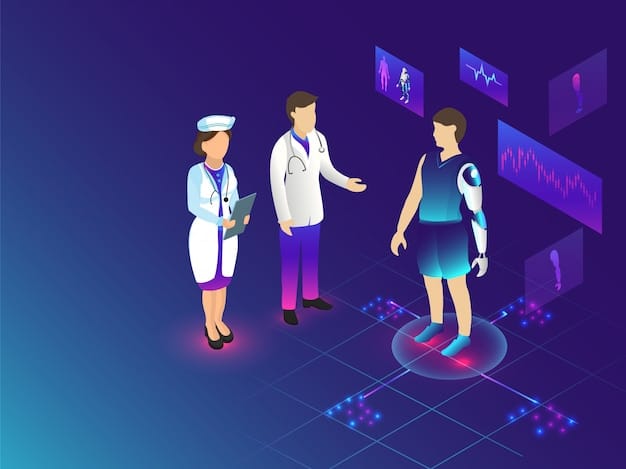AI in US Healthcare: Improve Outcomes and Cut Costs by 10%

AI in US Healthcare: 3 Ways to Improve Patient Outcomes and Reduce Costs by 10% examines leveraging artificial intelligence to enhance healthcare delivery, focusing on improved diagnostics, personalized treatment plans, and streamlined administrative processes to achieve significant cost savings and better patient experiences.
The US healthcare system faces persistent challenges, including rising costs and varying patient outcomes. However, innovative solutions are emerging, with AI in US Healthcare: 3 Ways to Improve Patient Outcomes and Reduce Costs by 10% offering transformative potential to address these issues directly.
The Promise of AI in US Healthcare
Artificial intelligence (AI) is rapidly transforming industries, and healthcare is no exception. In the United States, the integration of AI offers the potential to revolutionize patient care, streamline operations, and reduce costs. This convergence of technology and healthcare promises to address some of the sector’s most pressing challenges.
AI applications in healthcare are diverse and powerful, ranging from diagnostic tools that improve accuracy and speed to personalized treatment plans that cater to individual patient needs. By leveraging AI, healthcare providers can enhance the quality of care while simultaneously improving efficiency and reducing financial burdens.

1. Enhancing Diagnostics with AI
One of the most promising applications of AI in healthcare is its ability to enhance diagnostic accuracy and speed. Traditional diagnostic methods can be time-consuming and prone to human error. AI algorithms, on the other hand, can analyze vast amounts of medical data to identify patterns and anomalies that might be missed by clinicians.
AI-driven diagnostic tools can lead to earlier and more accurate diagnoses, which in turn can improve patient outcomes and reduce healthcare costs. For example, AI algorithms have been shown to improve the detection of cancerous tumors in medical images, allowing for earlier intervention and treatment.
AI-Powered Image Analysis
AI algorithms can analyze medical images, such as X-rays, CT scans, and MRI scans, with remarkable precision. This technology is particularly effective in detecting subtle abnormalities that may be indicative of disease.
Predictive Analytics in Diagnostics
AI can also be used to predict the likelihood of a patient developing a certain condition based on their medical history, lifestyle, and other relevant factors. This predictive capability allows healthcare providers to implement preventive measures and early interventions, further improving patient outcomes.
- Improved accuracy in detecting diseases
- Faster turnaround times for diagnostic results
- Reduced risk of human error in image analysis
- Enhanced ability to predict future health risks
In summary, AI’s ability to enhance diagnostic accuracy and speed is transforming the landscape of healthcare. By leveraging AI-powered tools, healthcare providers can make more informed decisions, leading to earlier interventions and improved patient outcomes.
2. Personalized Treatment Plans Through AI
Personalized medicine is gaining traction as healthcare providers recognize the importance of tailoring treatment plans to individual patient needs. AI plays a pivotal role in enabling personalized treatment by analyzing patient data to identify the most effective treatment strategies.
AI algorithms can consider a wide range of factors, including a patient’s genetic makeup, medical history, lifestyle, and environmental exposures, to develop customized treatment plans that maximize efficacy and minimize side effects. This level of personalization can lead to better outcomes and improved patient satisfaction.
AI in Drug Discovery and Development
AI is accelerating the discovery and development of new drugs by analyzing vast amounts of data to identify potential drug candidates and predict their efficacy and safety. This can significantly reduce the time and cost associated with bringing new drugs to market.
Remote Patient Monitoring with AI
AI-powered remote patient monitoring systems allow healthcare providers to track patients’ vital signs, symptoms, and medication adherence from a distance. This real-time monitoring enables timely interventions and can prevent hospital readmissions.

- Tailored treatment plans based on individual patient needs
- Improved drug discovery and development processes
- Enhanced remote patient monitoring capabilities
- Reduced risk of adverse drug reactions
In conclusion, AI is revolutionizing personalized treatment in healthcare by enabling data-driven decision-making and customized treatment strategies. This level of personalization holds the potential to significantly improve patient outcomes and enhance the efficiency of healthcare delivery.
3. Streamlining Administrative Processes and Reducing Costs
The administrative aspects of healthcare often contribute significantly to overall costs. AI can streamline these processes, automating tasks such as billing, insurance claims processing, and appointment scheduling. This automation reduces administrative overhead and allows healthcare providers to focus on patient care.
AI-driven solutions can also optimize resource allocation, ensuring that staff and equipment are used efficiently. By reducing waste and improving operational efficiency, AI can lead to substantial cost savings for healthcare organizations.
AI-Powered Chatbots for Patient Support
AI chatbots can provide 24/7 support to patients, answering common questions, scheduling appointments, and providing medication reminders. This reduces the burden on human staff and improves patient satisfaction.
Predictive Analytics for Resource Allocation
AI algorithms can analyze historical data to predict future demand for healthcare services, allowing organizations to allocate resources more effectively. This can help to reduce wait times, improve patient flow, and optimize staffing levels.
- Automated billing and insurance claims processing
- Enhanced patient support through AI chatbots
- Optimized resource allocation based on predictive analytics
- Reduced administrative costs and improved operational efficiency
In summary, AI’s ability to streamline administrative processes and reduce costs is transforming the operational side of healthcare. By automating tasks and optimizing resource allocation, AI enables healthcare organizations to improve efficiency and allocate more resources to patient care.
Addressing Challenges and Ethical Considerations
While the potential benefits of AI in healthcare are significant, it is important to address the challenges and ethical considerations associated with its implementation. These include concerns about data privacy, algorithmic bias, and the potential for job displacement.
Healthcare organizations must prioritize data security and privacy to protect patient information from unauthorized access. Additionally, it is crucial to ensure that AI algorithms are fair and unbiased, providing equitable care to all patients, regardless of their background or demographics.
Ensuring Data Privacy and Security
Robust data security measures are essential to protect patient information from cyber threats and unauthorized access. This includes implementing encryption, access controls, and regular security audits.
Mitigating Algorithmic Bias
AI algorithms should be developed and validated using diverse datasets to ensure that they do not perpetuate existing biases in healthcare. Regular monitoring and evaluation are necessary to identify and address any biases that may arise.
Ultimately, responsible implementation of AI in healthcare requires a collaborative effort involving healthcare providers, technology developers, policymakers, and patients. By working together, we can harness the full potential of AI while mitigating its risks and ensuring that it benefits all members of society.
The Future of AI in US Healthcare
The future of AI in US healthcare is bright, with ongoing advancements in technology and increasing adoption by healthcare providers. As AI algorithms become more sophisticated and data becomes more readily available, the potential for improving patient outcomes and reducing costs will continue to grow.
In the coming years, we can expect to see even more innovative applications of AI in healthcare, including personalized drug therapies, virtual reality-based treatments, and AI-powered robotic surgery. These advancements will transform the way healthcare is delivered, making it more accessible, affordable, and effective.
- Personalized drug therapies tailored to individual genetic profiles
- Virtual reality-based treatments for pain management and rehabilitation
- AI-powered robotic surgery with enhanced precision and dexterity
- Predictive models that anticipate and prevent disease outbreaks
In conclusion, the future of AI in US healthcare is filled with potential, promising to revolutionize patient care and transform the healthcare landscape. By embracing AI and addressing its challenges and ethical considerations, we can create a healthcare system that is more efficient, effective, and equitable for all.
| Key Point | Brief Description |
|---|---|
| 🔍 Enhanced Diagnostics | AI improves accuracy and speed of diagnosing diseases. |
| 💊 Personalized Treatment | AI enables treatment plans tailored to individual patient needs. |
| 💰 Cost Reduction | AI streamlines administrative tasks, reducing healthcare costs. |
| 🔒 Ethical Considerations | Addressing data privacy, bias, and job displacement is crucial. |
FAQ
▼
AI algorithms analyze vast amounts of medical data and images to identify patterns and anomalies more accurately than traditional methods, leading to earlier and more precise diagnoses.
▼
AI analyzes individual patient data, including genetics and medical history, to create tailored treatment plans that optimize efficacy and minimize potential side effects.
▼
AI automates administrative tasks, optimizes resource allocation, and improves operational efficiency, resulting in significant cost savings for healthcare organizations.
▼
Ethical concerns include ensuring data privacy and security, mitigating algorithmic bias, and addressing potential job displacement in the healthcare industry.
▼
The future includes more personalized drug therapies, virtual reality-based treatments, and AI-powered robotic surgery, making healthcare more accessible, affordable, and effective.
Conclusion
AI in US Healthcare: 3 Ways to Improve Patient Outcomes and Reduce Costs by 10% shows a promising path forward, offering the potential to transform healthcare delivery by improving diagnostics, personalizing treatment plans, and streamlining administrative processes. Addressing ethical considerations is crucial to ensure equitable and responsible implementation, ultimately leading to a more efficient and effective healthcare system for all.





